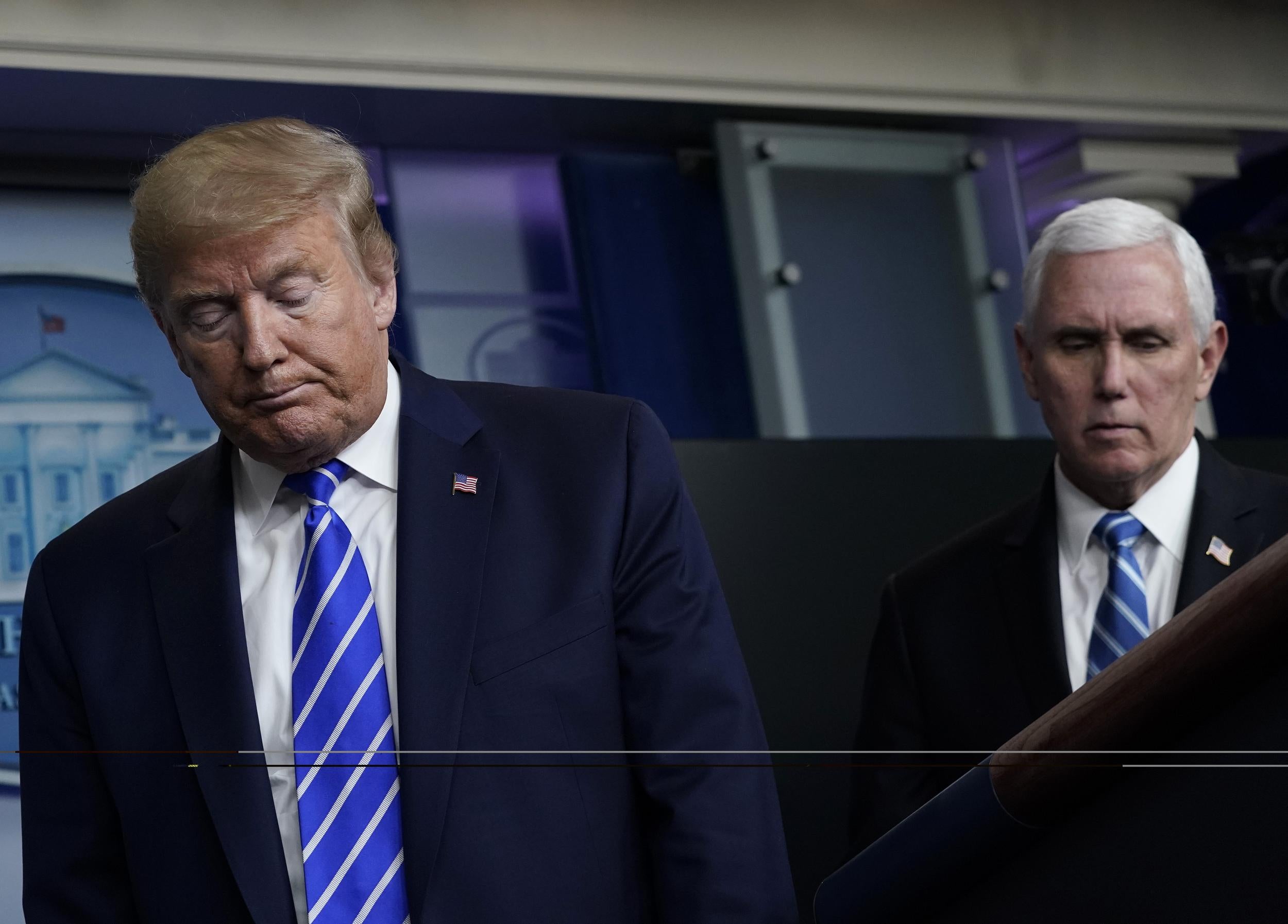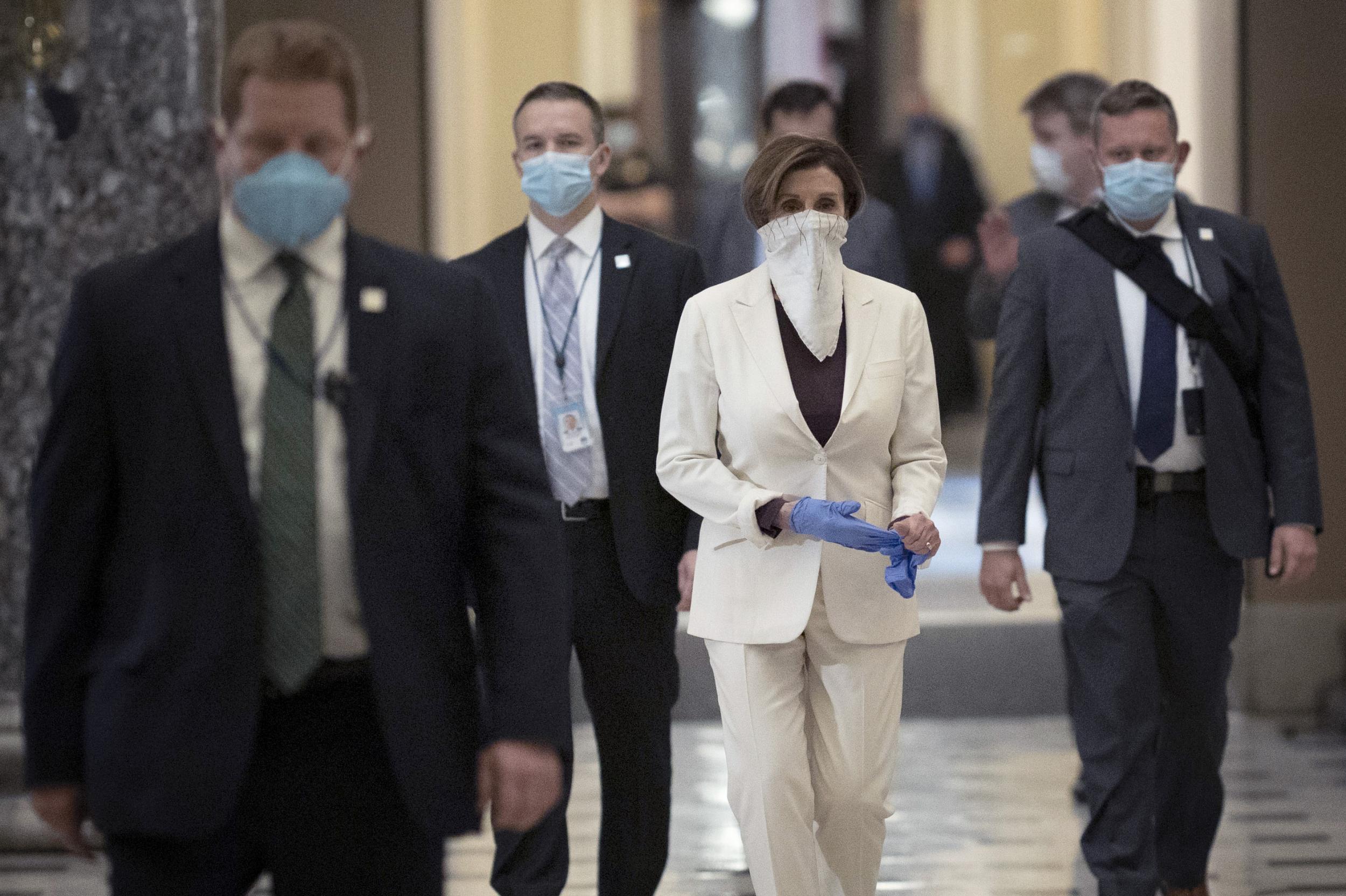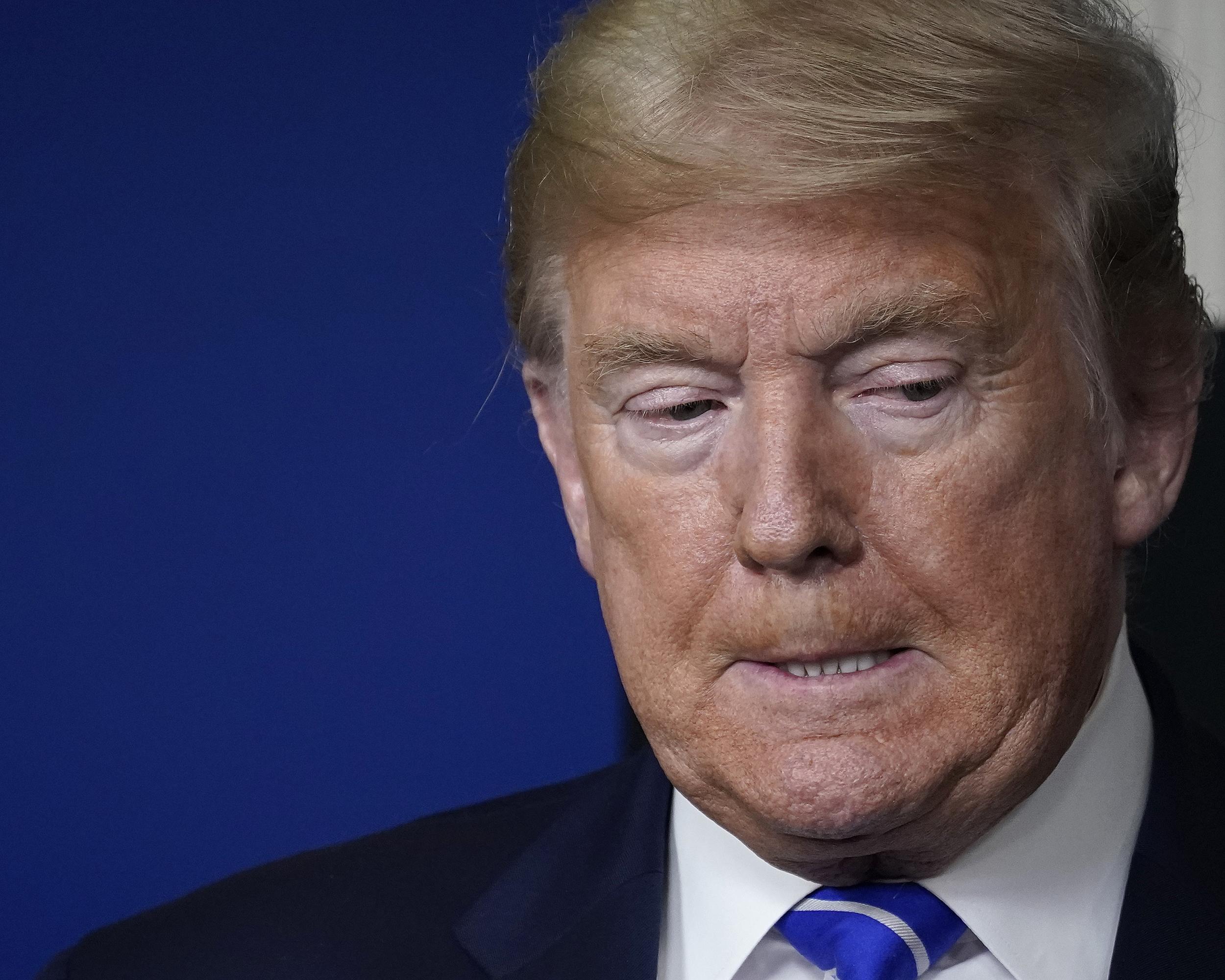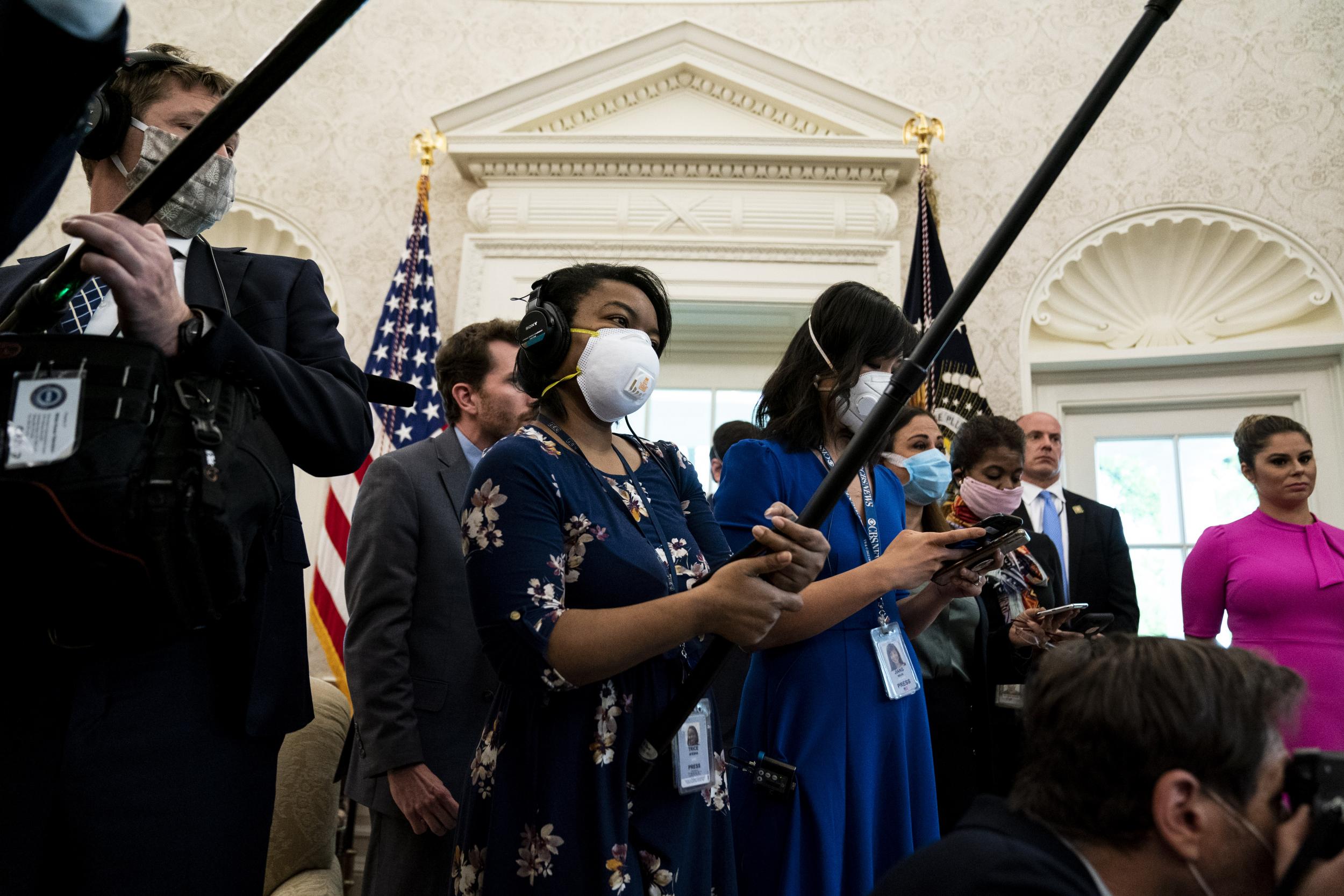Coronavirus: House of Congress worries about its effectiveness during pandemic
The frustration is evident among House Democrats, with many increasingly convinced that Congress is functioning as a shadow of its former self
Your support helps us to tell the story
As your White House correspondent, I ask the tough questions and seek the answers that matter.
Your support enables me to be in the room, pressing for transparency and accountability. Without your contributions, we wouldn't have the resources to challenge those in power.
Your donation makes it possible for us to keep doing this important work, keeping you informed every step of the way to the November election

Andrew Feinberg
White House Correspondent
House Democrats have blasted President Donald Trump’s response to the coronavirus pandemic as inept and dangerous. Party leaders insisted on the creation of a special committee to root out abuse in the nearly $3tn of federal aid flowing to shuttered businesses and unemployed workers. And they have called for a robust national strategy for mass testing and tracing of the illness that has claimed more than 53,000 US lives.
Yet amid the biggest national crisis in generations, the one branch of government where Democrats hold power has largely sidelined itself, struggling so far to adopt remote voting, Zoom video hearings or any of the other alternative methods that have become standard for most workplaces in the age of Covid-19. No administration official has appeared at a congressional hearing in over a month. Committees have been unable to meet in person to debate and advance bills. There is no firm date for when the new oversight panel will start its work.
“I haven’t had a classified briefing in over six weeks,” said Rep. Jason Crow, D-Colo., a member of the House Armed Services Committee, which needs to reauthorize the annual policy bill for the military. Crow said he has yet to get senior Democrats to agree with his proposal to “open a nationwide infrastructure” for classified briefings for members of Congress, by using the secure rooms in regional FBI offices and military bases across the nation.
The frustration is evident among House Democrats, with many increasingly convinced that Congress is functioning as a shadow of its former self, with rank and file largely bystanders as party leaders hastily assemble massive spending bills. More than a dozen told The Washington Post in recent days that the House was failing to meet its constitutional mandate amid an epochal global crisis, abdicating power to the Trump administration as the nation demands strong political leadership.
“We’re basically ill-prepared for the nature of this emergency,” said Rep. Denny Heck, D-Wash. “Obviously, there are a lot of things going on with how this money is being spent that are clearly not in keeping with the spirit of what we intended, and it’s harder for us to exercise oversight when we’re all at home in our war rooms.”
That discontent has increased pressure on House Speaker Nancy Pelosi, D-Calif., and other leaders to change more than 230 years of rules to allow for remote deliberations and voting – and some Democrats are joining calls from Republicans who simply want to bring Congress back to Washington, spurning advice from public health authorities who continue to recommend that Americans work from home whenever possible.
Congress’ inability to adapt some of its core functions to the new reality stands in contrast to other organs of the federal government, including the Supreme Court, which will hear oral arguments by teleconference for the first time starting next month.
Trump, meanwhile, presides over near-daily televised briefings from the White House and commands the vast powers of the executive branch – imposing an immigration ban one day and promoting unproven medical treatments the next – as hobbled lawmakers struggle to provide an institutional counterweight.
While the Democratic-run House considers a path forward on possible remote work, the 100-member, Republican-led Senate is on track to return to Washington as soon as 4 May. Majority Leader Mitch McConnell, R-Ky., said in media interviews last week that he intends to quickly return to confirming judges and other Trump appointees.

Bringing the House back stands to be a riskier decision, and its leaders have signalled that they are concerned not only about its current 429 members but also about its much larger population of aides and support staff. But as the only arm of government under Democratic control, it is uniquely positioned to challenge Trump.
So far, Democrats have had an impact on the federal response to the crisis: they have pushed to enlarge unemployment benefits, pump funding into the health-care system and beef up the federal role in Covid-19 testing – adding hundreds of billions of dollars in spending above what Republicans initially proposed.
At least four House committees have conducted closed briefings with federal officials by telephone or videoconference.
Pelosi, meanwhile, is under pressure from her caucus’ left flank to move quickly on an expansive new relief bill amid the worst unemployment since the Great Depression – one that directs aid to poor and working-class Americans rather than large employers and small-business owners, as well as hundreds of billions of dollars in additional relief for state and local governments.

“Not having Congress here absolutely hurts our capacity to push,” said Rep. Alexandria Ocasio-Cortez, D-N.Y. “Because we are not here, these negotiations are happening behind closed doors. We can’t message on the developments. We can’t go every day and say: Republicans are fighting against hospitals. Republicans are fighting against testing. If we were actually legislating in a normal schedule, then we can report these day-by-day developments and use public pressure to get more. And so I think that we’re losing a lot of leverage.”
Compounding the frustration has been an emerging partisan split on how to adapt the House’s work to the new normal. A push for remote voting that began in mid-March, as the dimensions of the pandemic first became apparent, languished for weeks as House leaders explored the technological, constitutional and security implications of such a change.
Last week, Pelosi endorsed a plan devised by House Rules Committee Chairman Jim McGovern, D-Mass., to allow for proxy voting in limited circumstances – permitting members to authorise a colleague to vote on the floor on their behalf – but Republicans erupted in protest, and plans for a vote were postponed. Meanwhile, the measure creating the new investigative committee passed on a party-line vote.
A bipartisan group of negotiators met Thursday to discuss rules changes, and House Majority Leader Steny Hoyer, D-Md., left the meeting with narrower ambitions – saying he hoped to move forward with remote committee work in the coming weeks to allow for the passage of the yearly defence and spending bills. Proxy voting, or any other remote voting alternative, he said, would be a heavier lift.

“We need to build confidence,” he said. “And how do you build confidence? You do it in small segments, and using the committees to do this, it seems to me, makes sense.”
McGovern said in an interview Friday that the slow pace reflected the innate conservatism of an institution where change is judged not just in the implication for the present, but for decades if not centuries – including scenarios in which the other party might wield the majority.
“To some, it’s not like a big deal, but it is a big deal,” he said. “There were constitutional questions which we had to explore. There are logistical questions. There are security questions. There’s also the reality that not all members of Congress are, you know, at the same level in terms of being comfortable with technology.”
Congress is not alone among legislatures in its struggle to figure out how the business of convening and deliberating – which by definition violate social-distancing guidelines – can proceed.
On Tuesday, the British Parliament unanimously approved new rules that will allow for videoconferencing in debates and during the famous “question time” of the prime minister, while approving a goal of moving towards remote voting using technology. But one of the world’s longest continuing legislatures, at 700 years, still faces great limits. Just 50 of the 650 members will be allowed on the House of Commons floor for debates and only another 120 can participate by video.
In Brussels, the European Parliament has gone entirely online, including a vote-by-email system, and its members report mixed results so far. McGovern said Friday that he had been in touch with that body’s officials about their system.
In US state capitals, the legislatures have taken different approaches. In Richmond, Virginia, the state House of Delegates met under a canopy on the lawn outside the Capitol, while the smaller state Senate took over a massive event space inside a nearby museum.
New Jersey, Vermont and Kentucky adopted some version of either remote electronic voting or proxy voting, and in Oklahoma, the state House has operated similarly to the US House, with very small groups of lawmakers allowed on the floor to vote.
Many Democratic House members identified another obstacle last week: The belief that House Republicans are slow-walking any rules changes out of political self-interest – that is, a more functional House means a more powerful counterweight to Trump and a GOP-majority Senate.
“They don’t think it’s in their parochial interest as the minority,” said Rep. Eric Swalwell, D-Calif., an early advocate of remote voting and other technological innovations. “But I do think it’s in the country’s interest that we can convene more than just once a month. ... The longer this goes on, the more obvious the need for it will become.”
Rep. Tom Cole, R-Okla., the senior Republican on the House Rules Committee, said the resistance has less to do with political gamesmanship than with a healthy respect for 231 years of accumulated custom and practice.
“I don’t think anybody’s trying to outmanoeuvre one another or score points ... I’m one of these people that think you really do need to be face to face,” he said. “The more and more we move to this, I think, the less and less powerful we will be as an institution within the framework of government.”
Still, House lawmakers said they are perplexed that three months after federal authorities confirmed the first Covid-19 case in the United States, Capitol Hill remains in a state of suspended animation. None have been more exasperated than the freshmen who propelled Democrats back into the majority in 2018 – a group of more than 60 relatively young lawmakers, many from national security or private-sector backgrounds.

“I don’t think we have found our footing on how to conduct our oversight role and our legislative role,” Rep. Elissa Slotkin, D-Mich., said Thursday, as she waited to cast a vote on the latest coronavirus aid legislation, a $484 billion package.
As she spoke, the House Intelligence Committee met in a room below the Capitol for its first classified briefing since mid-March – typically a weekly occurrence.
A former CIA analyst who spent years as a senior Pentagon adviser, Slotkin, won a Republican-leaning district outside Detroit that has been hit hard by the deadly virus. “I’m watching all my constituents have to adapt and have to adjust to working even when it’s uncomfortable for some, and I think we should have been doing the same thing,” she said.
Slotkin, when she served as an assistant secretary of defence, often used a nearby FBI office for classified discussions when she was home in Michigan and needed to quickly get that information – a system that exists, just not for Congress.
“It’s not re-creating the wheel, it’s just making the wheel available to Congress,” she said.
Meanwhile, lawmakers of all backgrounds are dealing with personal struggles that also make it hard to just race back to Washington.
Crow, 41, whose wife is a professor at the University of Colorado, has newfound responsibilities as a home-school teacher to his children, ages 10 and 7, just like millions of other Americans. Slotkin devotes much of her time to her elderly parents who, she said, do not always appreciate the necessity of strict social distancing.
Several sitting lawmakers have been diagnosed with cancer and other chronic conditions. Others are afraid of passing the virus to loved ones. Rep. Lois Frankel, D-Fla., who takes care of her 92-year-old mother, spent most of Thursday in her apartment, coming to the Capitol only briefly: “I’m just going to vote.”
At a news conference Friday, Pelosi suggested that the passage of the $484bn rescue legislation went smoothly enough that the House could return “soon” to consider a follow-up bill. Groups of roughly 50 lawmakers were summoned to the Capitol to slowly enter the House, cast their vote and then immediately leave, based on alphabetical order. Getting the groups to cast their votes took more than an hour.
Still, McGovern said Pelosi “has come to the understanding” that something will have to be done in the coming weeks to expand remote operations even if Republicans do not agree.
“Shame on us if we don’t do something,” he said. “I mean, what happens if this virus comes back, surges in the fall more fiercely, and even more extraordinary measures have to be put into place? The bottom line is, we need to be ready for that.”
Yet Democrats left Washington again Thursday – six weeks after the House first left Washington amid the pandemic – with no firm remedy in place for how to hold committee hearings, craft legislation and get it ready for a House vote.
On Friday evening, Pelosi wrote a letter to her caucus in which she said that “in the days ahead” leaders would “hear your views” on how to legislate from afar.
The Washington Post
Subscribe to Independent Premium to bookmark this article
Want to bookmark your favourite articles and stories to read or reference later? Start your Independent Premium subscription today.

Join our commenting forum
Join thought-provoking conversations, follow other Independent readers and see their replies
Comments